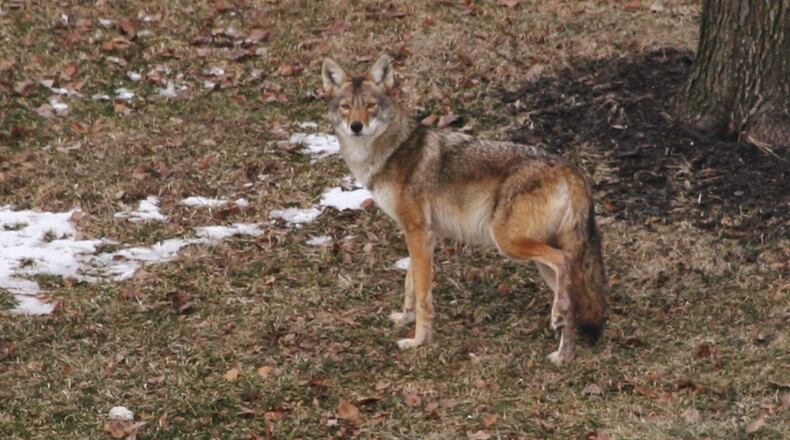“I know in our neighborhood we’ve had a lot of sightings, and one of our neighbors lost their dog,” she said.
Just a few blocks away from Stone’s home, a dog let out in a backyard was attacked.
In response to complaints about coyotes, the city posted a tip sheet on its website. It states that people who live near parks, woods and golf courses may see more coyotes.
Just two years ago at Christmas time, several West Chester Twp. residents reported coyote sightings and attacks on small animals, including pets like dogs.
Coyotes are common throughout Ohio’s 88 counties in both rural and urban settings, according to the Ohio Department of Natural Resources’ Division of Wildlife.
Although coyotes mainly eat small mammals such as rabbits and mice, small pets also may be taken. Owners of small dogs and cats should keep their pet inside or stay with them at night when coyotes are most active, according to the ODNR.
While curious, coyotes are usually afraid of humans. Shouting, banging pots or clapping one’s hand can discourage a coyote investigating a yard. To prevent a coyote from returning, remove “attractants” such as garbage and pet food before nightfall and clean up around the grill, the ODNR suggests.
Veterinarians at the Care Center in Sharonville have been seeing more coyote attacks. Dr. Caitlin Hokanson, an associate emergency veterinarian, said coyote attacks are happening more frequently as coyotes move into urban and suburban areas.
“The attacks are not to be taken lightly,” Hokanson said.
Hokanson agreed with the tips posted by the city of Mason, especially keeping food inside and keeping trash bins covered.
Heather Milam of Mason said they no longer let their pets out alone. She lives near Pine Hill Lake Park, and already almost lost one of her dogs to a coyote.
“It makes me nervous, when I walk my dogs through the park, that we’re going to run into some coyotes,” she said.
There’s a feeling around Mason for some residents that not even the backyard is safe.
“It is really sad, because most of our pets, they’re part of our family,” Stone said.
If the aforementioned options do not work, the ODNR encourages residents to call 1-800-945-3543 to locate a nuisance trapper.
About the Author
